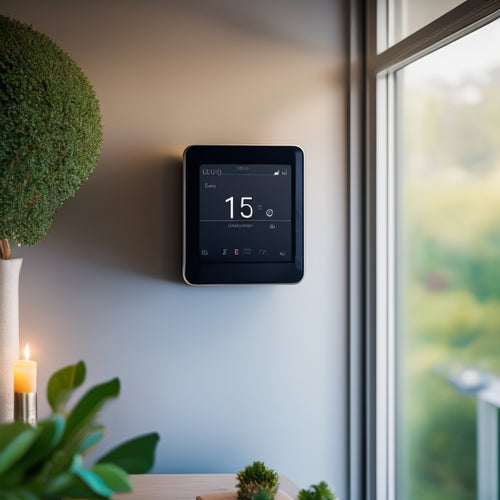
What Plugs Save Energy When Charging EVs?
Share
When charging your EV, you can save energy by using smart plugs that monitor and optimize your charging habits. These plugs identify inefficiencies, provide real-time monitoring, and offer customizable notifications to keep you informed. By integrating with renewable energy sources, such as solar power, you can reduce your carbon footprint and energy costs. Additionally, energy-harvesting plug technology captures ambient energy to power onboard systems, minimizing grid load. By leveraging these advanced charging technologies, you'll not only reduce energy waste but also contribute to a cleaner, sustainable future - and that's just the beginning of what's possible.
Key Takeaways
- Smart plugs with real-time monitoring and usage analytics help optimize charging habits and reduce energy waste.
- Level 2 chargers and DC Fast Chargers are more energy-efficient than traditional Level 1 chargers for daily driving and long trips.
- Solar-powered charging stations and energy-harvesting plug technology capture ambient energy, reducing grid load and carbon footprint.
- Intelligent plug solutions with remote access and energy forecasting adjust charging to off-peak hours, minimizing energy costs.
- Integration with renewable energy sources, such as solar energy, reduces reliance on the grid and promotes sustainable charging practices.
Optimizing EV Charging Efficiency
Most electric vehicle (EV) owners understand the importance of optimizing their charging routine to minimize energy waste and reduce their environmental footprint.
You can optimize your charging time by scheduling it during off-peak hours when electricity rates are lower. This not only reduces your cost savings but also decreases the load on the grid during peak hours.
Additionally, you can adjust your charging speed to match your needs, such as using a Level 2 charger for daily driving or a DC Fast Charger for long trips.
By integrating solar energy into your charging station solar-powered EV charging, you can reduce your reliance on the grid and carbon footprint.
Solar-powered EV charging systems enhance rural accessibility, energy self-sufficiency, and carbon neutrality.
By optimizing your charging routine, you can minimize energy waste, reduce your environmental footprint, and enjoy significant cost savings over time.
Smart Plugs for Energy Monitoring
Track your energy consumption in real-time with smart plugs specifically designed for electric vehicles. These innovative devices provide significant observations into your energy usage, enabling you to optimize your charging habits and reduce your carbon footprint. With smart home integration, you can monitor and control your EV's energy consumption remotely, ensuring you're always in the know.
| Feature | Benefit | Example |
|---|---|---|
| Real-time Energy Monitoring | Identify areas of inefficiency | Track your EV's energy consumption in real-time |
| Usage Analytics | Optimize charging habits | Analyze your daily energy usage to identify opportunities for improvement |
| Smart Home Integration | Remote monitoring and control | Control your EV's charging schedule from your smartphone |
| Customizable Notifications | Stay informed | Receive alerts when your EV's charging is complete or when energy usage exceeds a set threshold |
| Compatibility | Seamless integration | Compatible with popular smart home systems and EV models |
Plugging Into Renewable Energy
As you shift to electric vehicle ownership, you're likely motivated by a desire to reduce your environmental impact. One effective way to do so is by plugging into renewable energy.
Solar charging, for instance, allows you to utilize the power of the sun to fuel your EV. This not only reduces your carbon footprint but also lowers your energy costs.
Furthermore, many governments offer renewable incentives, such as tax credits or rebates, to encourage the adoption of clean energy sources. By investing in solar charging infrastructure, you can take advantage of these incentives, such as federal/state incentives, and enjoy long-term savings.
Additionally, solar energy can future-proof your business by adapting to regulations and consumer preferences. By doing so, you'll be contributing to a cleaner, more sustainable future while enjoying the freedom that comes with reduced energy dependence.
Energy-Harvesting Plug Technology
This innovative technology enables your EV to employ ambient energy from its surroundings, further minimizing its carbon footprint.
Energy-harvesting plug technology integrates tiny sensors and energy conversion systems into the plug design, capturing and converting ambient energy from the environment. This energy is then used to power your EV's onboard systems, reducing the load on the grid and your electricity bill.
By collecting energy from sources like vibrations, heat, or electromagnetic fields, this technology optimizes energy conversion and reduces waste. In line with the growing trend of renewable energy sources, this technology is a significant step towards a sustainable future.
Additionally, it complements the increasing adoption of fast charging hubs and smart charging systems. With energy-harvesting plug technology, you can enjoy the freedom to charge your EV sustainably, anywhere, anytime.
This state-of-the-art innovation is revolutionizing the way we think about energy and transportation, giving you more independence and a cleaner conscience.
Intelligent Plug Solutions for EVs
With your EV plugged in, intelligent plug solutions take charge of optimizing energy distribution, ensuring a seamless and efficient charging experience. These advanced plugs integrate with your home automation system, allowing you to monitor and control energy consumption remotely through a user-friendly interface. This level of control enables you to make informed decisions about your energy usage, reducing waste and saving you money.
| Feature | Description | Benefit |
|---|---|---|
| Real-time Monitoring | Track energy consumption in real-time | Optimize energy usage and reduce waste |
| Remote Access | Control charging sessions remotely | Convenience and flexibility |
| Energy Forecasting | Predict energy demand and adjust charging | Reduced strain on the grid |
| Automated Scheduling | Schedule charging sessions during off-peak hours | Cost savings and reduced peak demand |
| Integration with Renewable Energy | Prioritize renewable energy sources for charging | Reduced carbon footprint |
Frequently Asked Questions
Can I Use a Standard Household Outlet to Charge My Ev?
You can use a standard household outlet to charge your EV, but be aware that it'll take longer, and safety is a concern; a dedicated 240-volt outlet is recommended for faster charging speeds and ideal outlet safety.
Do EV Charging Plugs Work With All Types of Electric Vehicles?
As you venture into the EV world, you'll find that not all charging plugs are created equal, and compatibility is key; thankfully, most modern EVs use standardized charging plug types, like Type 1, Type 2, and CCS, ensuring seamless connections.
Can I Charge My EV in the Rain or Wet Conditions?
You can charge your EV in the rain or wet conditions, but you'll want to take safety precautions to guarantee the charging station and your vehicle's charging port are watertight to maintain charging efficiency.
Are EV Charging Plugs Compatible With Extension Cords?
Ha! You think you can just MacGyver an EV charging setup with an extension cord? Think again! When it comes to charging safety, extension cord limitations are no joke - don't risk a electrical fire, stick to dedicated charging stations.
Can I Charge My EV Using a 220-Volt Dryer Outlet?
You can charge your EV using a 220-volt dryer outlet, but it's essential to verify compatibility; a dedicated 240-volt EV charger will charge your vehicle markedly faster than a dryer outlet, with a 3-4 hour full charge versus 8-10 hours.
Related Posts
-

10 Best WiFi Outlets for Tracking Home Energy Usage
You can optimize your home's energy usage with the right WiFi outlets, which provide real-time monitoring and control...
-

Smart Energy: Greener Homes With Connected Power Devices
You can control and optimize your energy consumption with smart energy devices, reducing your carbon footprint by up ...
-

Why Transform Human Waste Into Garden Gold?
By changing human waste into garden gold, you'll reduce waste management costs, support sustainable agriculture, and ...


